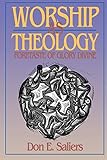Worship as theology : foretaste of glory divine / Don E. Saliers. [print]
Material type: TextPublication details: Nashville : Abingdon Press, (c)1994.Description: 255 pages ; 23 cmContent type:
TextPublication details: Nashville : Abingdon Press, (c)1994.Description: 255 pages ; 23 cmContent type: - text
- unmediated
- volume
- 9780687146932
- BV15
- BV15.S165.W677 1994
- COPYRIGHT NOT covered - Click this link to request copyright permission:
| Item type | Current library | Collection | Call number | Status | Date due | Barcode | |
|---|---|---|---|---|---|---|---|
 Circulating Book (checkout times vary with patron status)
Circulating Book (checkout times vary with patron status)
|
G. Allen Fleece Library CIRCULATING COLLECTION | Non-fiction | BV15.S25 1994 (Browse shelf(Opens below)) | Available | 31923001598784 |
Browsing G. Allen Fleece Library shelves, Shelving location: CIRCULATING COLLECTION, Collection: Non-fiction Close shelf browser (Hides shelf browser)
Part One: Liturgy and theology -- Human pathos and divine ethos -- Dogma and Doxa -- The eschatological character of worship -- Liturgy and theology: conversation with Barth -- Part Two: Liturgy as prayer -- Praising, thanking, blessing-gratitude as knowledge of God -- Invoking and beseeching -- Lamenting and confessing: truthful prayer -- Interceding: remembering the world to God -- Part Three: Liturgy in context -- Beyond the text: the symbolic languages of liturgy -- The liturgical "canon" in context -- For the sake of the world: liturgy and ethics -- Mystery, suffering, and the assembly's art -- The beautiful and the holy -- Advent and eschaton.
In Worship As Theology, Don Saliers discusses how worship is both theological (God-centered) and anthropological (embodied and embedded in specific human and cultural contexts). He illuminates worship as a theology "prayed, sung, and enacted." At the same time--by focusing upon specific dimensions of liturgical action such as praising, thanking, invoking, confessing, proclaiming, interceding, and blessing--he addresses the differences between the liturgical/sacramental and the "free-church"/evangelical church traditions. Underlying Saliers' approach is his basic conviction that Christian liturgy is an eschatological art. Theological integrity in worship, he asserts, calls for a permanent tension in the forms and patterns which reflect the "already" and "not yet" of Christian life in the world for the sake of the world. Worship As Theology, therefore, begins and ends with the eschatology of the divine promise, that the church's cry is still "Come, Lord Jesus!" and that God's will be done on earth "as in heaven."--Publisher's description.
COPYRIGHT NOT covered - Click this link to request copyright permission:
There are no comments on this title.






